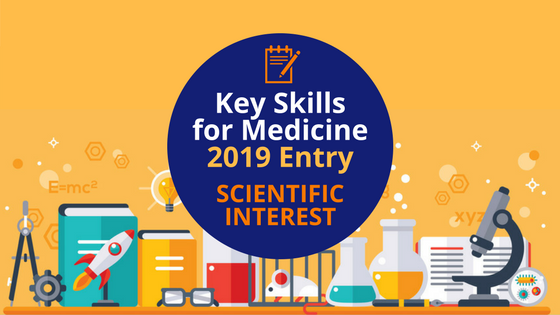
Welcome to our new blog series, Key Skills for Medicine for 2019 Entry! This series will explore different skills needed for medicine – from scientific interest to people skills – and how to demonstrate them easily.
This blog will focus on developing and demonstrating scientific interest.
Sitting the UKCAT this year? Try our one-day UKCAT Course!
Book our 2018 UKCAT Course1. Read around a subject
If you see something you find intriguing in a textbook, or you hear about something cool happening scientifically, try and follow it up.
Being able to show that you’re interested in knowing more beyond the school scientific curriculum is really important because doctors will always need to be reading up on the latest developments and guidelines in their field.
Reading more is an easy and quick way of showing interest in something, whether that’s by reading textbooks, scientific articles or just googling things you find intriguing.
It doesn’t have to be pages and pages of dense scientific literature – there are plenty of popular science books out there that go into different avenues of topics presented on the A-Level syllabus.
There are a few classic books everyone seems to quote in their personal statement, but anything that gets you thinking more about processes, reactions and scientific development will help you to show interest.
See 5 Books to Read for Aspiring Medics>>
2. Try and get some laboratory work experience
Every hospital will have a laboratory, whether that’s in their microbiology department (looking for which bugs are sensitive to which antibiotics), or as part of their research teams. There are also plenty of private laboratories looking into drug development and genetic testing (amongst so many other things).
Depending on what you’re interested in, contacting a lab and asking to spend a few days getting some experience is always worthwhile. It might be a shadowing placement, learning some of the basic techniques clinical scientists use every day, or it might be a more hands-on experience where you’re actively producing growth mediums and helping to run tests.
The time itself will be helpful in understanding exactly what happens when you send off a blood sample and the role of the clinicians in the laboratory, but it will also demonstrate initiative and be a more unusual way of showing your scientific interest!
3. Tutoring younger students in science and related subjects
A lot of what you learn in your later years of school is building on key subjects you learnt earlier on. Tutoring younger students in these subjects is a really good way of keeping your basic knowledge fresh, potentially earning some money and using the topics as a springboard for your own work.
Using your enthusiasm for Biology and Chemistry to help younger students shows a myriad of skills and demonstrates that you’re not just saying you like science to get into medical school – you actively spend your time trying to help others with their interest in it too!
4. Read scientific news
It doesn’t have to be anything too in-depth or complex, but keeping an eye on the latest scientific news (even through the science section on the BBC) is a really simple and easy way of showing you’re curious about what’s going on in the community.
There are plenty of sites out there that produce daily round-ups of interesting research and discoveries – and it would only take a few minutes a day to just check up on what’s happening in the world.
You’re probably already hearing about changes in how the NHS works, new vaccines and healthcare scares – so just take a little bit of extra time to follow up on exactly what’s happening, where those changes have come from and what’s coming next.
5. Try to organise an extended project or a personal study project
Schools and colleges always push the EPQ as a good way of showing interest outside of the normal curriculum, and they’re right. Not only do you get to study a topic of your choosing in more detail, but you’ll learn crucial critical thinking and research skills essential for any scientific job.
With support from a tutor at school and with plenty of structured activities to help you produce a body of work, a study project is an easy way to show that you’re willing to look beyond what you’re learning in class.
Read How to Get an A in Your Medicine EPQ>>
Words: Katie Hodgkinson
